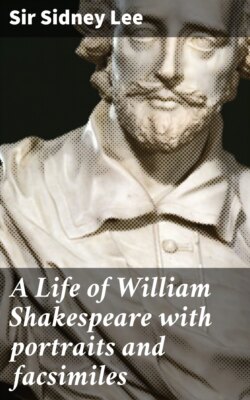Читать книгу A Life of William Shakespeare with portraits and facsimiles - Sir Sidney Lee - Страница 56
На сайте Литреса книга снята с продажи.
Greene’s attack. Chettle’s apology.
ОглавлениеTable of Contents
The applause attending the completion of this historical trilogy caused bewilderment in the theatrical profession. The older dramatists awoke to the fact that their popularity was endangered by the young stranger who had set up his tent in their midst, and one veteran uttered without delay a rancorous protest. Robert Greene, who died on September 3, 1592, wrote on his deathbed an ill-natured farewell to life, entitled ‘A Groats-worth of Wit bought with a Million of Repentance.’ Addressing three brother dramatists—Marlowe, Nash, and Peele or Lodge—he bade them beware of puppets ‘that speak from our mouths,’ and of ‘antics garnished in our colours.’ ‘There is,’ he continued, ‘an upstart Crow, beautified with our feathers, that with his Tygers heart wrapt in a players hide supposes he is as well able to bumbast out a blanke verse as the best of you; and being an absolute Johannes factotum is, in his owne conceit, the only Shake-scene in a countrie. … Never more acquaint [those apes] with your admired inventions, for it is pity men of such rare wits should be subject to the pleasures of such rude groomes.’ The ‘only Shake-scene’ is a punning denunciation of Shakespeare. The tirade was probably inspired by an established author’s resentment at the energy of a young actor—the theatre’s factotum—in revising the dramatic work of his seniors with such masterly effect as to imperil their hold on the esteem of manager and playgoer. The italicised quotation travesties a line from the third piece in the trilogy of Shakespeare’s ‘Henry VI:’
Oh Tiger’s heart wrapt in a woman’s hide.
But Shakespeare’s amiability of character and versatile ability had already won him admirers, and his successes excited the sympathetic regard of colleagues more kindly than Greene. In December 1592 Greene’s publisher, Henry Chettle, prefixed an apology for Greene’s attack on the young actor to his ‘Kind Hartes Dreame,’ a tract reflecting on phases of contemporary social life. ‘I am as sory,’ Chettle wrote, ‘as if the originall fault had beene my fault, because myselfe have seene his [i.e. Shakespeare’s] demeanour no lesse civill than he [is] exelent in the qualitie he professes, besides divers of worship have reported his uprightnes of dealing, which argues his honesty, and his facetious grace in writing that aprooves his art.’
